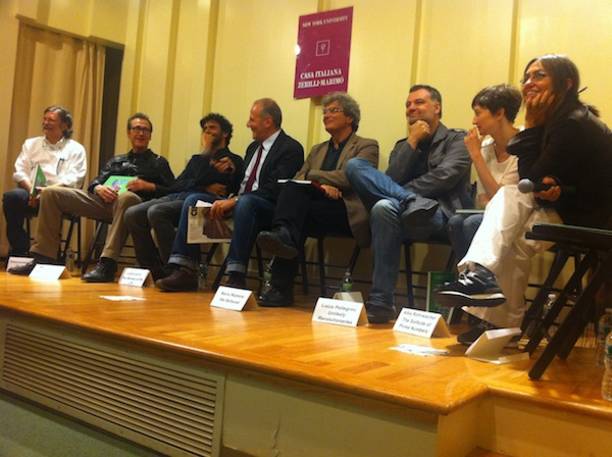


Not only is Open Roads the festival that has been bringing the best of Italian cinema to an American audience since 2000, it is also an important occasion for Italian filmmakers and artists to reflect on their cultural identity.
The main issue that Open Roads tackles is the evolution of the definition of “Made in Italy” in the field of cinema, an art in transition between the glorious era of the great masters of Italian filmmaking such as Fellini, De Sica and Visconti, and a future of technological challenges in an extremely competitive race for new ideas and globally appealing stories.
Screenings of this year’s most remarkable Italian movies are taking place at Lincoln Center (full program available at www.filmlinc.com), but Casa Italiana Zerilli-Marimò and the Italian Cultural Institute are not left behind.
On May 31, the ICI was the location for the opening event of the festival’s eleventh edition, a round table with Italian and American producers, directors and academics discussing the importance of tax incentives for Italian and international filmmaking in Italy.
On the occasion, Consul Francesco Maria Talò observed that Italian cinema has in fact “opened roads, being a great precursor,” and a protagonist of an international movement evolving worldwide as a systemic industry.
An industry that, even in dealing with significant budget cuts, is doing well in the boot-shaped country.
Riccardo Viale, director of ICI, states that even if public financing to cinema in Italy was 11% lower in 2010, 141 movies were produced in Italy over that year. Italy is the 8th most prolific country in the world as far as movie production is concerned, and the revenues from theaters have grown 47% between 2009 and 2011.
Also, Italians are actually starting to value Italian movies over foreign movies: 50% of the movies Italians go to see in theaters are Italian.
Alessandro D’Alatri, the Italian director whose latest movie, On The Sea, is showing at Lincoln Center, senses a change in the Italian film industry: “Twenty years ago directors were keen on rebuilding a texture for Italian cinema after the dark season of the 1980s. The relationship with the audience is now fully re-established, and Italian cinema has the energy, the courage and the experience to be big in the international market again.”
D’Alatri also took part in the round table “Italian Cinema On Stage”, held at Casa Italiana on June 3.
Most of the Italian directors whose movies are featured in the festival, together with young actors starring in them, were guests of Casa Italiana’s director Stefano Albertini for the evening. Tidbits of the films were presented to the audience and then commented by the directors and artists, unveiling behind the scenes details and discussing the main themes of the movies.
What emerges from all the movies is a strong need for self-analysis and self-consciousness. Italian directors are asking themselves what Italy is, going back to its historical roots (as in We Believed by Mario Martone and, under a totally cinephile perspective, in Giovanna Taviani’s Return to the Aeolian Islands), analyzing its flaws( in Whatsoeverly, starring Antonio Albanese, The Passion by Carlo Mazzacurati, and Unlikely Revolutionaries by Lucio Pellegrini), and following with a critical yet amused look the evolution of the Italian family, from the early 1900s (in Giulia Cecere’s The First Assignment), to today (in Sergio Castellitto’s Love and Slaps, in Marco Bellocchio’s Sisters Never, and in Luca Lucini’s The Woman Of My Life).
Source URL: http://test.iitaly.org/magazine/focus/art-culture/article/open-roads-italian-cinema-stage
Links
[1] http://test.iitaly.org/files/photo1307387669jpg